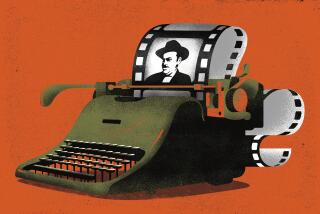Orson Welles’ Legendary Radio Past Revived on Tape
- Share via
The past does not always live up to its reputation. Sentimental attachment puts a rosy filter over the aging reality. Old movies become charming for their oldness, not their quality.
Then again, you sometimes discover that the past is as good as legend says it was. Orson Welles’ early work in radio is itself the stuff of legend, even though very little of the work has been available. The Mercury Theatre’s “War of the Worlds” broadcast, 50 years ago this Halloween, has been duly honored as the bizarre phenomenon it was, but what about the other material?
The veteran broadcaster Frank Beacham and a longtime Welles associate, Richard Wilson, have now put together what they promise is the first of a series of cassette packages of Welles’ radio work. Called “Theatre of the Imagination: Radio Stories by Orson Welles and The Mercury Theatre,” the package is on the Voyager label.
There are six cassettes, five on various radio shows broadcast between 1938 and 1946, the sixth a memoir of Welles by Wilson himself, the late John Houseman and other Mercury Theatre veterans, and narrated by Leonard Maltin.
Over the years Wilson had safeguarded in his garage a dusty carton of audio tapes Welles himself had had no interest in preserving. The tapes were copies of the original acetate recordings made during the broadcasts. The two producers listened to 160 hours of fast-degenerating information. But fortunately the acetates themselves were preserved in the Lilly Library at the University of Indiana.
The acetates were of indifferent quality to begin with, done as air-checks and full of pops, scratches and surface noise. But, by the use of some near-miraculous state-of-the-art techniques, the acetates were first transferred to digital tape (by Digital Magnetics in Hollywood) and then cleaned up by a new computer process at Sonic Solutions in San Francisco.
The music, most of it by Bernard Herrmann, still suffers most. It is furry and blurry, as if indeed it were being heard on a cheap radio. But the voices and the sound effects are remarkably vibrant, with a they-are-here presence.
The star, inevitably, is Welles the actor. In an hourlong adaptation of “A Tale of Two Cities” from 1938, he plays both the aged Dr. Manette and Sidney Carton and his reading of Carton’s “a far, far better thing that I do” farewell is at least the equal of Ronald Colman’s from the film.
The package begins with “Rebecca,” broadcast before Alfred Hitchcock did the film and starring Margaret Sullavan as the nameless new Mrs. Max de Winter, with Mildred Natwick as the hateful Mrs. Danvers. The script, by Welles and Houseman, leaves some ambiguities in the resolution of the plot, but it is a smashing drama, with a contrived but charming interview with author Daphne du Maurier (“by short wave”) at the end.
Welles’ vaulting ambitions as producer are well demonstrated. Here is an ingenious half-hour telescoping of Joseph Conrad’s “Heart of Darkness” from 1945, with Welles narrating the horrors of Mr. Kurtz in Africa. He explains in an afterword that the Conrad was to have been the Mercury’s first film, but they did “Citizen Kane” instead.
In a 1942 broadcast from a series sponsored by Lady Esther cosmetics, Welles adapted a John Galsworthy story called “The Apple Tree,” with Geraldine Fitzgerald as a country lass too briefly loved by a proper gent from London, played tremulously by Welles as a now middle-aged man remembering what might have been.
Way ahead of “Twilight Zone” was a thriller called “The Hitch Hiker,” about a terrifying cross-country trip with a surprising destination. It was written by Lucille Fletcher, who also wrote the classic “Sorry, Wrong Number.”
Welles reads John Donne and Shakespeare and, as a final oddment, there is a local radio show from San Antonio in 1940 on which Welles and H. G. Wells met and talked for the first and only time. Not surprisingly, they admired each other.
Welles as producer-host concludes all the shows, signing himself as “Obediently yours” and affirming that radio is story and he is a storyteller first and last. The cassettes leave no doubt just how confidently and imaginatively he was at home in radio, as he was before and after radio in the theater, and was to be in film.
There is above all in these tapes a breathtaking bravura sureness of attack, the very young and enormously gifted new boy in town, with that uniquely deep, mature and mellifluous voice suggesting, between the utterances, that the wonders would never cease. And, for a long time, they never did.
The entire “Theater of the Imagination” package, narrated by actress Ellen Geer, and with additional text and recordings by producer Frank Beacham, will be broadcast Dec. 26 on KCRW radio from noon to 5 p.m. and again after the evening news break from 6:30 to 8 p.m.
More to Read
The biggest entertainment stories
Get our big stories about Hollywood, film, television, music, arts, culture and more right in your inbox as soon as they publish.
You may occasionally receive promotional content from the Los Angeles Times.










